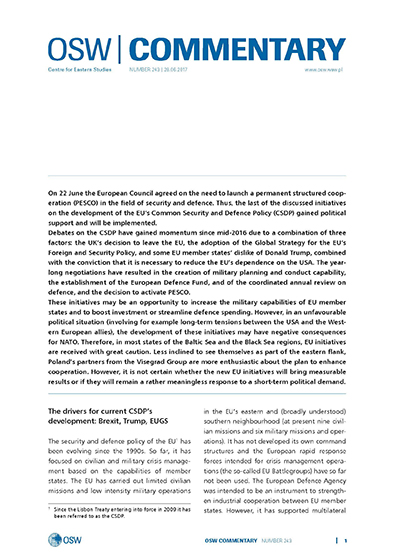In the clutches of the Kremlin. Azerbaijan’s security policy
In the clutches of the Kremlin. Azerbaijan’s security policy
Author(s): Aleksandra Jarosiewicz
Subject(s): International relations/trade, Security and defense, Military policy
Published by: OSW Ośrodek Studiów Wschodnich im. Marka Karpia
Keywords: Kremlin; Azerbaijan; security policy
Summary/Abstract: The changes which have been taking place over the past few years in Azerbaijan’s international environment and the growing concern about internal stability have led to President Ilham Aliyev’s regime to thoroughly revise the country’s security policy by establishing closer relations with Russia and opening up to co-operation with Iran. One consequence of this move was Azerbaijan’s victory in the so-called Four-Day War in Nagorno-Karabakh in April this year – a symbolic success in military terms which nevertheless brought about a real political breakthrough. Baku has chosen the political rapprochement with Russia because it has no other alternative. Over the past three years, Azerbaijan has revised its risk assessment and has reached the conclusion that the West cannot guarantee its security, Turkey’s policy is unpredictable, and the strengthening position of its traditional enemy, Iran, generates threats to Azerbaijan. The rapprochement with Russia is a tactical solution intended at helping maintain internal stability and to weather the unfavourable geopolitical, economic and social conditions. The co-operation with the Kremlin has brought tangible benefits: a new dynamic in the conflict over Nagorno-Karabakh (beneficial to Azerbaijan); and a strengthening of the regime’s stability, which is necessary during a continuing economic slump. In strategic terms, closer relations with Russia in fact mean a withdrawal from the previous vision of Azerbaijan’s foreign policy based on co-operation with the West and Turkey. The consequences of this turn towards Russia will include a further bolstering of the authoritarian regime, restricting Azerbaijan’s political subjectivity and making it part of the geopolitical bloc being built by Russia in the post-Soviet area, for example, as part of the Eurasian Economic Union. The situation in Azerbaijan will also depend on the emerging anti-Western Russian-Iranian-Turkish concert of powers which Baku may also join.
Series: OSW Commentary
- Page Count: 7
- Publication Year: 2016
- Language: English
- Content File-PDF

